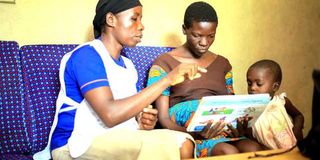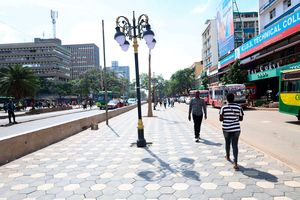Bicycle for health in Kakamega County

Ms Sophia Awinja, a Community Health Promoter engages an expectant Ms Rodah Nadiri at her home in Emakhubari village in Busia County during a household visit. PHOTO| Angeline Ochieng.
What you need to know:
- According to the medic, referrals in a day at the facility have gone up since the 40 CHPs attached to the facility started using bicycles.
- While the initiative has proven transformative, challenges remain. Mr Makomere, a local CHP leader, highlighted the cost of maintaining the bicycles
A section of residents in Kakamega County reside in rural and informal settlements where access to proper healthcare is limited residents due to low income and the long distance to health facilities.
Although Community Health Promoters (CHPs) serve as vital links between residents and health facilities, their efforts to conduct visits and make referrals are sometimes hindered by the vast distances and the large number of households they need to cover.
Irene Nanjira, a CHP from Mumias East, is responsible for covering 112 households each month within her designated area. Her role involves conducting home visits, educating families on preventive health practices and personal hygiene, monitoring and treating common ailments, and identifying complex cases that require referral to the nearest clinic or hospital. At times the CHPs have to pay for logistics out of pocket to ensure that they meet their targets.
“I was walking literally from house to house on my routine visit to check on the wellbeing of the households under my care. It was tough since the county government was only giving us a monthly stipend of Sh2,500. I couldn’t even afford to hire a motorbike. The houses are far away from Mung’ang’a Health Centre where I am supposed to make referrals. As a result, I managed to visit only 10 households in a month,” said Ms Nanjira.
Mr Moses Makomere, another CHP from Esikura B area in Mung’ang’a who is expected to take care of 110 households in a month could only manage eight houses every day. " I live far from the health facility and it was expensive because it meant paying for transport to attend training and meetings at the facility," he shares.
However, these struggles are now a thing of the past after a non-governmental organisation operating in the locality distributed bicycles to dozens of CHPs.
“The bicycles have eased my household visits. Since I received mine, I have made more than 20 visits in a day and have increased the number of referrals for expectant mothers. They are now attending clinics,’’ said Mr Makomere.
Ms Horida Amimo, the nurse-in-charge at Mung’ang’a Health Centre noted an increase in hospital visits since the bicycles were distributed to the CHPs.
“Mothers are now making regular prenatal visits and this has saved lives and pregnancy-related complications,” said Ms Amimo.
According to the medic, referrals in a day at the facility have gone up since the 40 CHPs attached to the facility started using bicycles. “We get at least 20 referrals in a day, double the previous numbers,” she noted.
Besides using the bicycles for health visits to their clients, some CHPs are using the cycles to supplement what they receive from the government.
Ms Nanjira said she uses her bike to fetch water and distribute it to her neighbours and hotels at a cost of Sh20 for every jerrycan.
"I am proud because I now cover all my households and even revisit them within a month," said Ms Irene Nanjira, a CHP in Mumias East. She attributes her efficiency to the bicycle she received, which allows her to assist people with tasks like registering for the Social Health Authority (SHA).
Before acquiring the bicycle, Ms Nanjira spent over Sh1,000 monthly on transport for household visits. "I saved that money and even managed to start a small poultry farm that keeps me busy when I am not on duty. The bicycle also helps me transport sick individuals to the hospital," she added.
While the initiative has proven transformative, challenges remain. Mr Makomere, a local CHP leader, highlighted the cost of maintaining the bicycles. " The spare parts are expensive and hard to find," he said.
Mr. Peter Wechuli, the Buffalo Bicycles Programme Manager for Kakamega County, explained that the initiative aims to address the challenge of long distances to healthcare facilities. "We’ve distributed 1,500 bicycles to CHPs in Kakamega to help them reach clients on time and improve their fitness," he said.
The success of the programme has inspired its expansion to Bungoma, Siaya, and Kisumu counties, where it continues to support CHPs in providing essential primary healthcare services in both informal settlements and remote areas.
[email protected]





